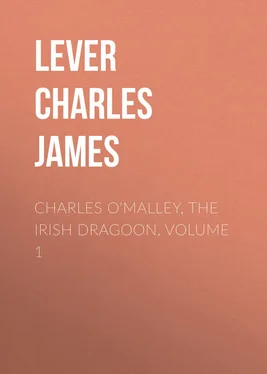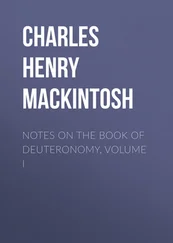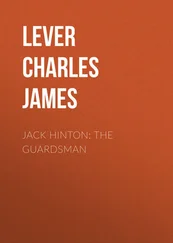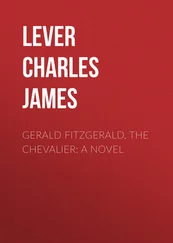Charles Lever - Charles O'Malley, The Irish Dragoon, Volume 1
Здесь есть возможность читать онлайн «Charles Lever - Charles O'Malley, The Irish Dragoon, Volume 1» — ознакомительный отрывок электронной книги совершенно бесплатно, а после прочтения отрывка купить полную версию. В некоторых случаях можно слушать аудио, скачать через торрент в формате fb2 и присутствует краткое содержание. Издательство: Иностранный паблик, Жанр: literature_19, foreign_antique, foreign_prose, на английском языке. Описание произведения, (предисловие) а так же отзывы посетителей доступны на портале библиотеки ЛибКат.
- Название:Charles O'Malley, The Irish Dragoon, Volume 1
- Автор:
- Издательство:Иностранный паблик
- Жанр:
- Год:неизвестен
- ISBN:нет данных
- Рейтинг книги:4 / 5. Голосов: 1
-
Избранное:Добавить в избранное
- Отзывы:
-
Ваша оценка:
- 80
- 1
- 2
- 3
- 4
- 5
Charles O'Malley, The Irish Dragoon, Volume 1: краткое содержание, описание и аннотация
Предлагаем к чтению аннотацию, описание, краткое содержание или предисловие (зависит от того, что написал сам автор книги «Charles O'Malley, The Irish Dragoon, Volume 1»). Если вы не нашли необходимую информацию о книге — напишите в комментариях, мы постараемся отыскать её.
Charles O'Malley, The Irish Dragoon, Volume 1 — читать онлайн ознакомительный отрывок
Ниже представлен текст книги, разбитый по страницам. Система сохранения места последней прочитанной страницы, позволяет с удобством читать онлайн бесплатно книгу «Charles O'Malley, The Irish Dragoon, Volume 1», без необходимости каждый раз заново искать на чём Вы остановились. Поставьте закладку, и сможете в любой момент перейти на страницу, на которой закончили чтение.
Интервал:
Закладка:
“To Dublin straight; there’s to be a grand lodge next week. But sure Mr. Crow knows better than me.”
Billy after this became silent. A moody revery seemed to steal over him; and he was evidently displeased with himself for his want of tact in not discovering the three Mr. Trenches of Tallybash, though he only caught sight of their backs.
Mickey Free interrupted not the frame of mind in which he saw conviction was slowly working its way, but by gently humming in an undertone the loyal melody of “Croppies Lie Down,” fanned the flame he had so dexterously kindled. At length they reached the small town of Kinnegad. While the coach changed horses, Mr. Crow lost not a moment in descending from the top, and rushing into the little inn, disappeared for a few moments. When he again issued forth, he carried a smoking tumbler of whiskey punch, which he continued to stir with a spoon. As he approached the coach-door he tapped gently with his knuckles; upon which the reverend prelate of Maronia, or Mesopotamia, I forget which, inquired what he wanted.
“I ask your pardon, gentlemen,” said Billy, “but I thought I’d make bold to ask you to take something warm this cold day.”
“Many thanks, my good friend; but we never do,” said a bland voice from within.
“I understand,” said Billy, with a sly wink; “but there are circumstances now and then, – and one might for the honor of the cause, you know. Just put it to your lips, won’t you?”
“Excuse me,” said a very rosy-cheeked little prelate, “but nothing stronger than water – ”
“Botheration,” thought Billy, as he regarded the speaker’s nose. “But I thought,” said he, aloud, “that you would not refuse this.”
Here he made a peculiar manifestation in the air, which, whatever respect and reverence it might carry to the honest brethren of 13,476, seemed only to increase the wonder and astonishment of the bishops.
“What does he mean?” said one.
“Is he mad?” said another.
“Tear and ages,” said Mr. Crow, getting quite impatient at the slowness of his friends’ perception, – “tear and ages, I’m one of yourselves.”
“One of us,” said the three in chorus, – “one of us?”
“Ay, to be sure,” here he took a long pull at the punch, – “to be sure I am; here’s ‘No surrender,’ your souls! whoop – ” a loud yell accompanying the toast as he drank it.
“Do you mean to insult us?” said Father P – . “Guard, take the fellow.”
“Are we to be outraged in this manner?” chorussed the priests.
“‘July the 1st, in Oldbridge town,’” sang Billy, “and here it is, ‘The glorious, pious, and immortal memory of the great and good – ‘”
“Guard! Where is the guard?”
“‘And good King William, that saved us from Popery – ‘”
“Coachman! Guard!” screamed Father – .
“‘Brass money – ‘”
“Policeman! policeman!” shouted the priests.
“‘Brass money and wooden shoes;’ devil may care who hears me!” said Billy, who, supposing that the three Mr. Trenches were skulking the avowal of their principles, resolved to assert the pre-eminence of the great cause single-handed and alone.
“‘Here’s the Pope in the pillory, and the Devil pelting him with priests.’”
At these words a kick from behind apprised the loyal champion that a very ragged auditory, who for some time past had not well understood the gist of his eloquence, had at length comprehended enough to be angry. Ce n’est que le premier pas qui coûte , certainly, in an Irish row. “The merest urchin may light the train; one handful of mud often ignites a shindy that ends in a most bloody battle.”
And here, no sooner did the vis-a-tergo impel Billy forward than a severe rap of a closed fist in the eye drove him back, and in one instant he became the centre to a periphery of kicks, cuffs, pullings, and haulings that left the poor deputy-grand not only orange, but blue.
He fought manfully, but numbers carried the day; and when the coach drove off, which it did at last without him, the last thing visible to the outsides was the figure of Mr. Crow, – whose hat, minus the crown, had been driven over his head down upon his neck, where it remained like a dress cravat, – buffeting a mob of ragged vagabonds who had so completely metamorphosed the unfortunate man with mud and bruises that a committee of the grand lodge might actually have been unable to identify him.
As for Mickey and his friends behind, their mirth knew no bounds; and except the respectable insides, there was not an individual about the coach who ceased to think of and laugh at the incident till we arrived in Dublin and drew up at the Hibernian in Dawson Street.
CHAPTER XIV
No sooner had I arrived in Dublin than my first care was to present myself to Dr. Mooney, by whom I was received in the most cordial manner. In fact, in my utter ignorance of such persons, I had imagined a college fellow to be a character necessarily severe and unbending; and as the only two very great people I had ever seen in my life were the Archbishop of Tuam and the chief-baron when on circuit, I pictured to myself that a university fellow was, in all probability, a cross between the two, and feared him accordingly.
The doctor read over my uncle’s letter attentively, invited me to partake of his breakfast, and then entered upon something like an account of the life before me; for which Sir Harry Boyle had, however, in some degree prepared me.
“Your uncle, I find, wishes you to live in college, – perhaps it is better, too, – so that I must look out for chambers for you. Let me see: it will be rather difficult, just now, to find them.” Here he fell for some moments into a musing fit, and merely muttered a few broken sentences, as: “To be sure, if other chambers could be had – but then – and after all, perhaps, as he is young – besides, Frank will certainly be expelled before long, and then he will have them all to himself. I say, O’Malley, I believe I must quarter you for the present with a rather wild companion; but as your uncle says you’re a prudent fellow,” – here he smiled very much, as if my uncle had not said any such thing, – “why, you must only take the better care of yourself until we can make some better arrangement. My pupil, Frank Webber, is at this moment in want of a ‘chum,’ as the phrase is, – his last three having only been domesticated with him for as many weeks; so that until we find you a more quiet resting-place, you may take up your abode with him.”
During breakfast, the doctor proceeded to inform me that my destined companion was a young man of excellent family and good fortune who, with very considerable talents and acquirements, preferred a life of rackety and careless dissipation to prospects of great success in public life, which his connection and family might have secured for him. That he had been originally entered at Oxford, which he was obliged to leave; then tried Cambridge, from which he escaped expulsion by being rusticated, – that is, having incurred a sentence of temporary banishment; and lastly, was endeavoring, with what he himself believed to be a total reformation, to stumble on to a degree in the “silent sister.”
“This is his third year,” said the doctor, “and he is only a freshman, having lost every examination, with abilities enough to sweep the university of its prizes. But come over now, and I’ll present you to him.”
I followed him down-stairs, across the court to an angle of the old square where, up the first floor left, to use the college direction, stood the name of Mr. Webber, a large No. 2 being conspicuously painted in the middle of the door and not over it, as is usually the custom. As we reached the spot, the observations of my companion were lost to me in the tremendous noise and uproar that resounded from within. It seemed as if a number of people were fighting pretty much as a banditti in a melodrama do, with considerable more of confusion than requisite; a fiddle and a French horn also lent their assistance to shouts and cries which, to say the best, were not exactly the aids to study I expected in such a place.
Читать дальшеИнтервал:
Закладка:
Похожие книги на «Charles O'Malley, The Irish Dragoon, Volume 1»
Представляем Вашему вниманию похожие книги на «Charles O'Malley, The Irish Dragoon, Volume 1» списком для выбора. Мы отобрали схожую по названию и смыслу литературу в надежде предоставить читателям больше вариантов отыскать новые, интересные, ещё непрочитанные произведения.
Обсуждение, отзывы о книге «Charles O'Malley, The Irish Dragoon, Volume 1» и просто собственные мнения читателей. Оставьте ваши комментарии, напишите, что Вы думаете о произведении, его смысле или главных героях. Укажите что конкретно понравилось, а что нет, и почему Вы так считаете.












